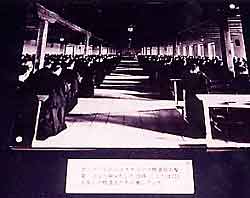

![]()
![]()
|
Newsletter of the District of Asia November - December 2000 The Conversion of JapanReview of a French book published in 1923, entitled "Talk on Japan"by Fr Urbain-Marie Cloutier OFM a Canadian Franciscan working in the Japanese Missions
The people of the Far-East are not barbarians, neither are they half civilized. They are people in full progress, modernizing themselves, rapidly to become our competitors. The Japanese in particular are copying all the improvements of the Western civilization, they are one of the great powers of the globe, and they will certainly become its masters if they can manage to discipline and dominate the Yellow Races as they are trying to do. Polite and refined even when in extreme poverty, the Japanese are rooted in the pride of their race which makes them always think of themselves as the sons of heaven, above other men, established in a superior zone.[1] This incredible pretension is the source of the greatest difficulty to their acceptation of the religion of Our Lord Jesus Christ. Fr. Urban-Marie consecrates a whole section of his book to make known the difficulties of the conversion of the Japanese to Christianity. After 60 years of apostolate (1860-1920), he notes, only 75,000 Japanese of the 60 millions inhabitants have consented to become Catholic. The conquests are slow, difficult, one by one. They require from the missionary patient explanations, sometimes long debates, where the priest must provide a vast erudition and a very firm logic. Moreover, with these bright minds, the difficulties of the language are rather serious. Delicate formulas of politeness, a extremely nuanced language, synonyms hard to distinguish where one is polite and the other not, all this puts the missionary in the impossibility to speak with ease and leaves him in front of his interlocutor in a disadvantageous position. This well-read people needs well written doctrinal books, conferences: the missionary is often only able to give a rudimentary catechism, presenting a doctrine in its bare elements, without attraction, without the strong arguments that can make it acceptable. It appears strange to these pagans.[2]
His community of 700 members in Poland At the national level, it is in their interest not to convert. The country's politics sense it. According to old beliefs, the emperor is a descendant of the gods, he is infallible, all wise; his authority cannot be questioned, his demands are never excessive. This attitude is well fed by those in government who see in it a protection against the wind of socialism, an assurance of inner peace for the Nation and its strength against other nations.[3] The Japanese draw a certain pride form this social peace, comparing it with pride to the troubles hitting Western people, shaking the most powerful nations and threatening the future of the world. They take advantage of this to exalt their institutions and their beliefs par above whatever comes from outside. To accept Christianity would be to diminish the prestige of the mikado, would be to introduce division in his empire where all the strength comes from the unity of commandment, lies in the submission of the subordinates to their hierarchical superiors. It is for these administrative reasons that we have seem recently the ruling class becoming willfully shintoist. It doesn't have a religious faith, but since the people wants a cult, the best is no doubt a national religion which would be another link between the various elements of the nation, another source of resistance against foreign invasion. Exteriorly, they are full of consideration for foreigners, even for the missionaries, but in reality, there is a deep suspicion and contempt.[4] Such is the bloc where Christianity wants to penetrate. To these pagans enriching themselves with our wars and who only dream of the present life, to these sons of heavens draped in their pride of being superiors, our poor missionaries, clad in their brown habits, poor and beggars, go to preach self-denial, continence and charity. [5] The Catholic worship also introduces in the very lives of the Japanese revolutionary habits. For us, time is divided in weeks, Sunday is the Day of the Lord, during which one must abstain from servile work, from commerce, from business. In Japan, it isn't like that. The week is almost unknown. “The official days of rest are the 1st and the 15th of the month. And even on these days, many people work. Thus the partition of the month in weeks has very little importance in Japan.” (p.221) Catholic workers, Catholic businessmen find themselves in a difficult situation for the simple reason that they want to observe the Sunday rest.[6] Moreover, converts often have to break with immoral and dishonest habits that are quite widespread. Japanese hold on to the appearance of virtue, but this exterior etiquette frequently hides the worst disorders of paganism. “This easily explains the hesitation and lack of will found in them when we speak to them of converting to Catholicism. They understand and admit that our holy religion is the safest and even the unique way to amend man's life and to save him. However they don't have the courage to break with their habits: the religion we put in front of them seems to impose on them too great sacrifices: they don't dare to go forward by the fear to disturb their conscience by the duties to be fulfilled. Sometimes though they declare themselves to be ready to become Christians. Some of them ask to receive baptism as soon as possible without having to study. Others on the contrary learn their catechism with fervor but this great zeal soon cools off. After some time their taste is lessened, their courage diminished. They give a thousand pretexts to excuse their inconstancy which they proudly never want to admit. At last, when their position becomes impossible to defend, they disappear quietly, postponing to a later date the moment of their conversion, which in most cases, simply means quitting totally and definitely.” (p.210)[7] These then, as can be seen, are the obstacles met by the religion of Our Lord Jesus Christ. Nevertheless, all the Catholics who visit the Far-East, are unanimous in the opportunity of a great effort to Christianize this country. This could actually concern the future of the whole world. No other country seem to have on the other Asian countries a similar influence. This people is one that studies, that only seeks to rise and to conquer. What benefits if Christian ideas could inspire the leaders of this Asian movement, but also what danger, what disaster for millions of souls, what catastrophe perhaps for the world if this movement was directed against the true God![8] The material world, strength, riches, seem to be the only goods worthy of their ambition. Missionaries must first destroy these dangerous impressions. That is the reason why they attempt to evangelize the learned. In this goal, St Pius X insisted with the Jesuits to open a Catholic university in Tokyo, which they did with energy. Germans, Americans, French Jesuits brought their help to this difficult mission and today, without deceiving oneself on the results obtained so far, we can honestly have some hope for the future.[9] We are trying to make the educated class of Japanese to understand the Catholic point of view, and we are trying to make some conquests whose influence and prestige will be strength for Catholicism. Already, Japan can count quality converts, such as Commandant Yamamoto, a fervent and convinced Catholic who, as official interpreter, accompanied the son of the mikado in his recent European tour.
By
divine inspiration he built his convent in the hills behind Nagasaki.
What is needed to convert Japan is a good number of educated and well provided missionaries who will be able to impose respect to this people and to train with great care the mind and the heart of neophytes. Above all, what is required is a first class national clergy. The work of seminaries is perhaps the one that preoccupies most the Apostolic Vicars. Unfortunately, priestly recruitment is difficult. Besides the few thousand Christians who persevere in their faith since the 16th and 17th century, Japanese have too far to go to have the energy to assume the obligations of the Catholic priesthood. The pagan souls need a very abundant grace to be attracted and be caught by such an austere vocation.[10] We must therefore pray hard that the Holy Ghost distributes widely His gifts on this land watered by the blood of so many martyrs. Let us ask that the reign of God come quickly in this country which will have such an influence on the rest of the world. When one sees all the unscrupulous merchants and corrupt agents of the West arriving in Japan, let us also have the ambition to send and to support the preachers of the Gospel and the keepers of good morals. [11] Fr. Adélard Dugré, S.J. in Les Missions Franciscaines. vol.1, No.2, Québec, April – June 1923, pp.107-108. [1] This comment is made in relation to the gradual adoption of the shintoism as Japan's nation religion at the time, but is no longer a case in post-war Japan. [2] All these difficulties must have been true, but this reasoning cannot explain a much more dramatic success of the missionaries in the 17th century Japan, when the underlying conditions mentioned above (e.g., needs for erudition and logic, difficulty with the language, etc.) presented themselves as much to St Francis Xavier. [3] Again, this comment was true at the time of the rapid emergence of new monarchism coupled with the adoption of the shintoism as the national religion. Shitoism may be an "old belief", but again, it does not explain the success in the 17th century vs. the very slow evangelization in late 19th century to date. [4] The author and the reviewer probably read very much into the spirit of the times. However, as can been seen from the post-war Japan, this apparent strength of the shintoism was a result of a political maneuver rather than a matter of religious conviction. After the war, most of the people "lost" faith in the national shintoism, but did not bother to replace it with another religion. The statement "there is a deep suspicion and contempt" for foreigners may seem a gross exaggeration today; where almost the reverse is true. But it has to be understood in the light of the persecutions against the foreign missionaries and the new faith they brought in the kingdom. [5] As regards poverty, one can recall the first journey of St Francis Xavier to Kyoto and its apparent failure (see above) and how he changed his tactics for the second journey. As regards chastity, St Francis himself rebuked some of the Daimyos for the public sins against nature existing in the kingdom. [6] This was true then, but is not true anymore. [7] These arguments remain very true to this day. [8] It is to be noted that, up to this day, the Japanese people are considered to have the best technology and diligence in Asia, but are never considered leaders by any of its Asian neighbors. [9] The theory given here that the Japanese people had already embraced the material world as its quasi-religion (by learning from the Western Powers), when the evangelization resumed in the late 19th century, is very true. [10] After the time of this writing, the Japanese clergy were mostly nationalized, but it did not change the slow speed of evangelization. [11] With careful analysis, it seems that the first missionaries to Japan were very successful in converting the Japanese people because Catholicism offered to them something that the traditional alternatives did not, such as the logical explanation of the faith, and marriage of religion and science. When Japan was subsequently closed to all foreigners and reopened to them more than two centuries later, Japanese people had been made tragically aware of their inferiority in every technical, economical and artistic field to the Western Powers, and made a collective determination to work as hard as they can to learn everything from the West and try to catch up with them as soon as possible. HOWEVER, the difference was that all these latest Western technologies and arts were shown to the Japanese people as separate from the Catholic religion. Therefore Japan concluded the Catholicism as superfluous to their all-important goal (as opposed to the 15th century Japanese who believed Catholicism to be the center of all the advancements the West has brought to the country). Japanese people are known to follow the wave. If the lord of the land and all its key lieutenants believed in Catholicism, people willingly followed. If the Japanese government determined that it was really the Western technologies that mattered and the religion was of no practical use, then people also concluded that this western religion was just waste of time. The Japanese military used this nature of the Japanese populace to its advantage when it mobilized practically all of them under the emperor, reigning as the living god. There was a big counter-swing just after the end of the world war, when the American democracy was the only true answer. It was then followed by the 50s-70s of hectic industrialism, when copying the western technology was the national passion, which culminated in the burst of the economic bubble in the early 90s. The interesting part of the story is, from the burst of the bubble, the Japanese people seemed to have lost a cause, and are still looking for one. Whatever Japan as a nation determines the next wave should be, they will certainly work very hard to achieve it, whether it be the American-style free capitalism, environmentalism, New Age, or whatever other cause. Japanese people love to follow the national trend; it is inherently very hard for a Japanese person to take actions that result in making himself stand out from his peers, and converting to Catholicism is surely one of them in the modern Japan. But if (and this is a very big IF) one day, the Japanese people decide that Catholicism is the new banner everyone should run under, then that wave would be as strong as was seen by the first Catholic missionaries some three and a half centuries ago. |


